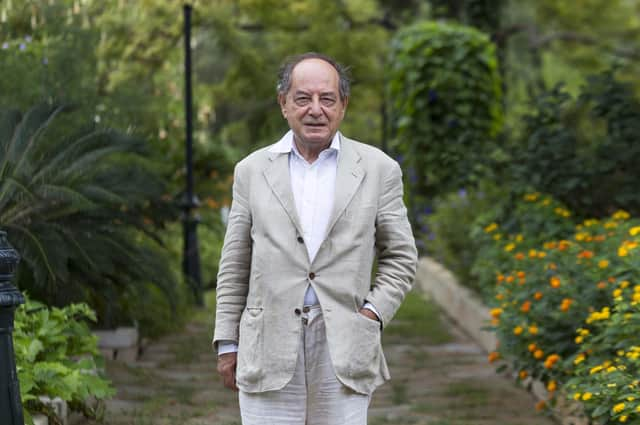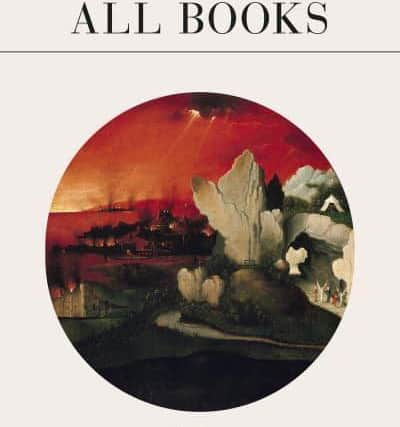Book review: The Book Of All Books, by Roberto Calasso


This is an intriguing and ingenious book. It forms the tenth and final part of a series on mythology, culture, paganism and consciousness, and how a “long history” with these impinges upon us still. Had Roberto Calasso not died earlier this year, I do not doubt there would have been more, and I do hope that some posthumous works, however fragmentary, come to light.
Although I have read The Marriage Of Cadmus And Harmony, K, The Ruin Of Kasch and The Celestial Hunter that still leaves me five yet to enjoy. Calasso was a publisher as well as a writer, and one tribute to him stated that he had “decided to join the Heaven publishing department” where he will be working on “a commentary on the Koran, which Dr Calasso will review himself because there is no other expert available”.
Advertisement
Hide AdIn The Book of All Books, Calasso turns from Greek and Vedic and palaeolithic myth to the Bible. My inkling that there may have been more to come is slightly bolstered because it is actually mostly about the Torah and then the nature of Judaism after Titus destroyed the Temple in Jerusalem. Jesus, Paul and Stephen get rather walk-on parts. But each and every page has an observation, a turn of phrase or a close reading that made me think “I never thought of that” or “that is exceptionally odd” or even sometimes “that is a bit of a leap”. But great wits jump, as Laurence Sterne reminded us.


Although the author Lila Azam Nanganeh referred to Calasso as “a literary institution of one”, there are authors with whom he shares a resemblance. In the eclectic nature of his thinking he is a peer with Umberto Eco, though Eco was more impish; he could be compared to WG Sebald, though Sebald is more suffused with melancholy. If there were one feature that distinguished him it was not the similarly polymathic imagination, but a combination of being incisive and cautious. Like any good reader, he tip-toes up to the text. The book is a chimera, in that in part he is re-narrating the stories, and at the same time is glossing them. In an aside he quips about how this genre has become somewhat fashionable. But it has a long history in terms of how the “Book” came to be read. The Midrash and the Commentaries have a family resemblance to this work.
The book has a very byordinar structure. One would expect that a book about the Bible would begin, well, with “In the beginning”. It does to an extent, but it interleaves the Genesis account with the cryptic mentions of “Wisdom” from Proverbs and from Sirach. Calasso is unafraid to draw on other sources – rabbinical writings, the Early Church Fathers, the Apocrypha and suchlike – to nuance his picture. But instead of going from Creation to Fall to Noah to Abraham, it spirals forward to the prophet Samuel and King Saul. The narrative does loop back to “the first generations”, but there is a sense that the story could not be told in a linear form. Indeed, we rarely read the Bible cover-to-cover, so this way of flagging up strange symmetries over disparate centuries is actually closer to how the scriptures are actually encountered. It has a kind of intermezzo on Freud’s problematic late work, Moses And Monotheism, where Freud resurrected a canard from Goethe that Moses was Egyptian, and was murdered by the people of Israel. It’s pretty much debunked, but understanding why Freud pursued this will-o’-the-wisp is fascinating. As always, it’s more about Freud than what he is studying.
Central to the thesis here is an inter-related network of terms. How do blood, separation, ransom, substitute and imitate all coalesce? For example, Calasso notes that eating food that still had blood in it – something unkosher – is at odds with the idea that the altar had to be smeared with blood. The idea of “holocaust”, the burning of sacrifices, is also problematic, especially how the word morphed into our instinctive reaction to it. That God “makes man in his image” and then forbids the creation of images is another paradox. Where Calasso is especially strong is in acknowledging the contiguity between various stories, such as the Flood, with Mesopotamian myths while at the same time being fascinated about what was different in this library. Prime among these is the notion of sin.
At a time when all forms of religious observance are under pressure, Calasso has a winking piece of optimism. With the Temple razed, the “holocausts” could not occur. As he notes, again slyly, the Temple must have smelt like an abattoir. In the post-Temple period, the Talmud, in yet another substitution, puts recitation over slaughtering animals. “When you are tired of studying, you can dedicate yourself to chores. But chores mustn’t be your main goal while you give your free time to study”. I can't disagree with that. Religion turned from obligation to dedication; from repetition to re-reading and re-reading.
This is a wonderful finale to a career. To be lucid and clever without being arcane or simplistic is a great gift, and one that shall be missed. One thing it made me notice is that in Ezekiel the wheeled and fiery chariots have the faces of an ox, an eagle, a lion and a man in the first chapter, and a cherub, an eagle, a lion and a man in the tenth chapter. I will suck many a pencil over that one. Explanations on a postcard please.
The Book Of All Books, by Roberto Calasso, Allen Lane, £25
A message from the Editor:
Advertisement
Hide AdThank you for reading this article. We're more reliant on your support than ever as the shift in consumer habits brought about by coronavirus impacts our advertisers.
If you haven't already, please consider supporting our trusted, fact-checked journalism by taking out a digital subscription at https://www.scotsman.com/subscriptions